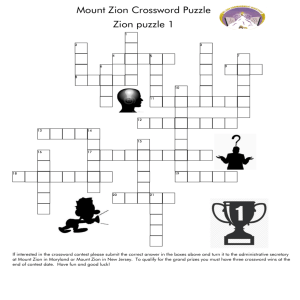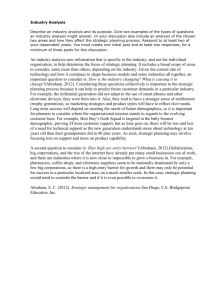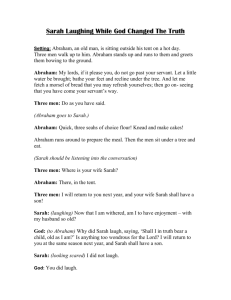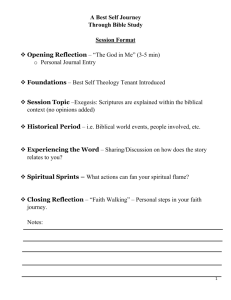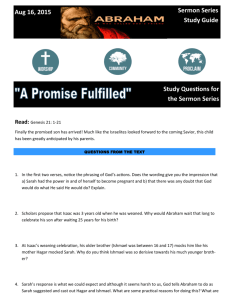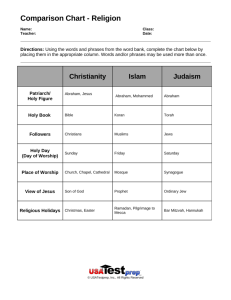6 July 2014 – The Reverend Mark Nestlehutt (text)
advertisement
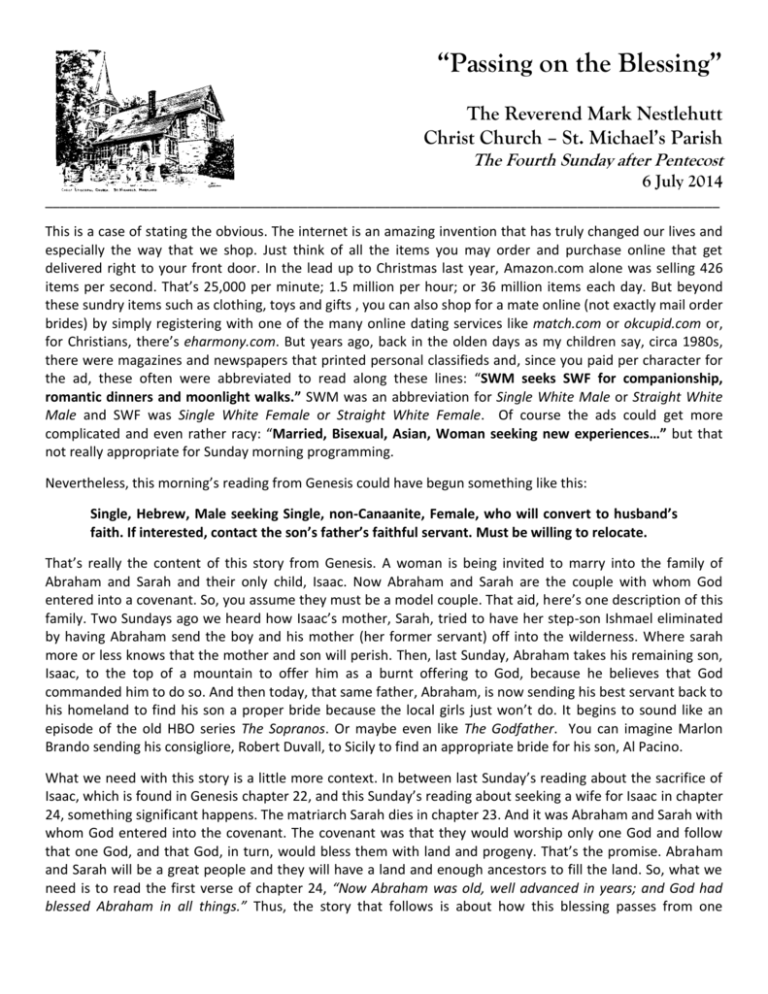
“Passing on the Blessing” The Reverend Mark Nestlehutt Christ Church – St. Michael’s Parish The Fourth Sunday after Pentecost 6 July 2014 __________________________________________________________________________________________ This is a case of stating the obvious. The internet is an amazing invention that has truly changed our lives and especially the way that we shop. Just think of all the items you may order and purchase online that get delivered right to your front door. In the lead up to Christmas last year, Amazon.com alone was selling 426 items per second. That’s 25,000 per minute; 1.5 million per hour; or 36 million items each day. But beyond these sundry items such as clothing, toys and gifts , you can also shop for a mate online (not exactly mail order brides) by simply registering with one of the many online dating services like match.com or okcupid.com or, for Christians, there’s eharmony.com. But years ago, back in the olden days as my children say, circa 1980s, there were magazines and newspapers that printed personal classifieds and, since you paid per character for the ad, these often were abbreviated to read along these lines: “SWM seeks SWF for companionship, romantic dinners and moonlight walks.” SWM was an abbreviation for Single White Male or Straight White Male and SWF was Single White Female or Straight White Female. Of course the ads could get more complicated and even rather racy: “Married, Bisexual, Asian, Woman seeking new experiences…” but that not really appropriate for Sunday morning programming. Nevertheless, this morning’s reading from Genesis could have begun something like this: Single, Hebrew, Male seeking Single, non-Canaanite, Female, who will convert to husband’s faith. If interested, contact the son’s father’s faithful servant. Must be willing to relocate. That’s really the content of this story from Genesis. A woman is being invited to marry into the family of Abraham and Sarah and their only child, Isaac. Now Abraham and Sarah are the couple with whom God entered into a covenant. So, you assume they must be a model couple. That aid, here’s one description of this family. Two Sundays ago we heard how Isaac’s mother, Sarah, tried to have her step-son Ishmael eliminated by having Abraham send the boy and his mother (her former servant) off into the wilderness. Where sarah more or less knows that the mother and son will perish. Then, last Sunday, Abraham takes his remaining son, Isaac, to the top of a mountain to offer him as a burnt offering to God, because he believes that God commanded him to do so. And then today, that same father, Abraham, is now sending his best servant back to his homeland to find his son a proper bride because the local girls just won’t do. It begins to sound like an episode of the old HBO series The Sopranos. Or maybe even like The Godfather. You can imagine Marlon Brando sending his consigliore, Robert Duvall, to Sicily to find an appropriate bride for his son, Al Pacino. What we need with this story is a little more context. In between last Sunday’s reading about the sacrifice of Isaac, which is found in Genesis chapter 22, and this Sunday’s reading about seeking a wife for Isaac in chapter 24, something significant happens. The matriarch Sarah dies in chapter 23. And it was Abraham and Sarah with whom God entered into the covenant. The covenant was that they would worship only one God and follow that one God, and that God, in turn, would bless them with land and progeny. That’s the promise. Abraham and Sarah will be a great people and they will have a land and enough ancestors to fill the land. So, what we need is to read the first verse of chapter 24, “Now Abraham was old, well advanced in years; and God had blessed Abraham in all things.” Thus, the story that follows is about how this blessing passes from one generation to the next; from Abraham and Sarah to Isaac and the wife to be found from Abraham’s extended family back home. The story unfolds like this: Abraham’s most trusted servant has sworn an oath that he will not find a wife for Isaac from the Canaanites, but that he will travel back to Abraham’s kindred’s homeland in search of a bride. And so this faithful servant travels to this land and then stops at a spring and he prays to God that the woman who comes to draw water at the spring, to whom he will ask for a drink, if she replies, “Drink, and I will draw water for your camels also,” then this will be a sign from God that this is the right woman for Abraham’s son Isaac. And so the servant meets Rebekah at the spring; she answers correctly; he asks whose child she is; and then she leads him to her father’s house. There the servant retells the story of why he is there and how he chose Rebekah. And Rebekah’s family hearing all this, asks their daughter if she wants to marry Isaac. Saying yes, she departs with her own servants and with Abraham’s servant and travels to the land of Canaan. There Isaac is waiting for her. Rebekah slips off her camel, discovers who he is and then enters into the tent where she became his wife. And we are told that Isaac was comforted after his mother Sarah’s death. In the very next chapter, Abraham dies and the blessing that God gave to Abraham and Sarah has passed to the next generation—to Isaac and Rebekah. The blessing that God gave to Abraham was this: “I will make a great nation. I will bless you and you will be a blessing to others.” And that blessing doesn’t end with Abraham and Sarah’s deaths. It doesn’t end with Isaac and Rebekah’s deaths either. It passes on to Jacob and Rachel. And, as Christians, we believe that this same blessing passes on to us. Our bible teaches that we should use our blessings to bless others. I know that this word “blessing” can feel like a stained glass word. Where I grew up in the Deep South, good folks never spoke of being fortunate or lucky, but of being blessed. But being blessed doesn’t stop at celebrating one’s good fortune. We are not blessed so that we can feel good, or be happy and comfortable, but so that we too can bless others. And the bible tells us that when we focus on blessing others—of taking care of their needs—that God will take care of our own needs. When we reach out in love to the people around us, we not only pass the blessing on to them individually, but we expand the blessing amongst all of us. On this Independence Day weekend, we speak of being a blessed nation and a blessed people. The adage I use is that these blessings, much like salvation—the saving grace and blessing of God—are meant for a community, a people. It’s less like a one-passenger automobile and more along the lines of a flight on Southwest Airlines—all seats arrive at the same destination. So, how do we then reach out to help others; to care for other in the name of Christ; and to share our blessings, our gifts, with those around us? Because a Christian life; a holy life is more about giving than getting; sharing, not hoarding. Perhaps we could run our own personal ad; something along these lines: Holy People; filled with God’s blessing. Seeking others with whom to share these blessings. Open to anyone created in God’s divine image. Race, Creed, Sexual orientation not relevant.
